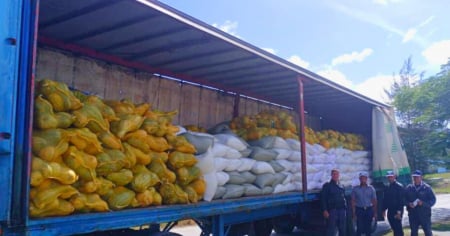The arrest on Tuesday of Héctor Julio Cedeño, a 71-year-old man, for selling candy on Monte and Factoría streets in Havana, has sparked outrage among passersby and vendors in the area.
Cedeño, known for being an opponent of the regime, has reported on several occasions the harassment he faces from the police and State Security, who, according to him, have tried to hinder his only means of survival amidst the deep economic crisis the country is experiencing, emphasized CubaNet in a video shared on Facebook.
During his detention, witnesses expressed their discomfort and shouted phrases like "There is hunger," highlighting the growing desperation of the population due to the lack of resources and the persecution of those trying to survive through informal work.
"And then they don't want anyone to film it and post it," a woman is heard saying as she witnesses the Cuban police run over the elderly man.
"Let him be; he is just fighting," added the same person, defending the man's right to earn a living with dignity.
The video also captures boos directed at the officers, both in uniform and plainclothes, who, with violence and against Cedeño's will, manage to force him into a patrol car.
The scene sparked outrage among witnesses, who expressed their disapproval of the police's actions.
The incident has led to an increased police presence in the area, with more officers and inspectors patrolling, which has intensified the pressure on other street vendors who protested the arrest of Cedeño, emphasized the cited news outlet.
This case adds to a series of operations against informal labor in Cuba, a practice that has become increasingly common due to economic precariousness and the lack of job opportunities.
This is not the first time the regime has attacked humble street vendors, who, with great effort, try to earn a dignified living, often after being abandoned by the government.
In December of last year, a heartbreaking scene unfolded for those at the José Martí International Airport in Havana, where a child selling candies ended up being taken away in a patrol car.
The journalist Mario Vallejo, from Univisión 23, shared on his Facebook wall the video showing the child walking away in tears as he sees an officer approaching him. The boy is holding a paint bucket in which he likely had candies.
The incident occurred at Terminal 3 of the airport. Although the boy ran quite far away, he could not prevent the officers from putting him in the police car and taking him away.
In December as well, the Cuban regime intensified its control over the informal economy, focusing on kiosks and sales points located on highways, main roads, and thoroughfares.
During a meeting of the Council of Ministers, led by Manuel Marrero Cruz, a program of actions was approved to eliminate irregularities detected in these establishments, which, according to the authorities, include illegal construction, tax evasion, violation of urban regulations, and the absence of formal contracts.
Frequently Asked Questions about Repression and the Economic Crisis in Cuba
Why was Héctor Julio Cedeño arrested in Havana?
Héctor Julio Cedeño was arrested for selling candy on the street, sparking outrage among passersby and local vendors. The arrest is part of a series of operations against informal work in Cuba, which have intensified due to the economic crisis.
How has the population reacted to the police repression in Cuba?
The population has reacted with outrage and rejection in response to the police repression. During Cedeño's arrest, witnesses shouted phrases like "There's hunger," highlighting the desperation due to the lack of resources. There have been boos and protests against police actions that prevent citizens from making a living through informal work.
What is the impact of the economic crisis on the Cuban population?
The economic crisis in Cuba has resulted in a situation of extreme precariousness for many citizens, forcing the elderly and children to work in informal conditions to survive. Inflation, shortages of basic goods, and low salaries have left many without sufficient resources, increasing begging and child labor.
What actions has the Cuban government taken in response to the economic crisis?
The Cuban government has intensified operations against informal work, which has been criticized for worsening the situation of the most vulnerable communities. The government's measures focus on confiscations and repression, rather than providing sustainable solutions to alleviate the economic crisis.
Filed under:
